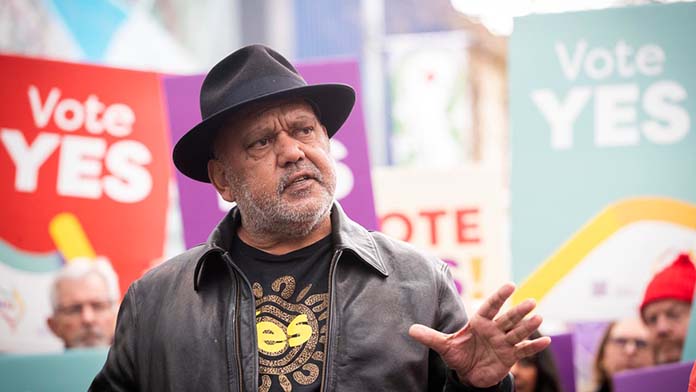In the dying days of the Voice to Parliament campaign, Cape York Indigenous leader Noel Pearson told a crowd at the elite King’s School in Sydney, quoting constitutional lawyer Greg Craven, “The Voice is a proposal so pathetically understated that I’m amazed most Indigenous people are settling for it.”
This was extraordinary coming from the man most responsible for the failed strategy behind the Voice referendum.
The Voice proposal was indeed pathetic by design.
During the campaign, many Voice supporters argued for the need to “enshrine” an advisory body in the constitution, claiming this would protect it from potentially hostile governments.
But Pearson himself was clear that the proposal allowed the government of the day to “scrap it entirely” at any time and reconstitute a new advisory body more to their liking.
The roots of the Voice proposal lie in the comprehensive rejection by the Aboriginal community of the tokenistic Recognise campaign for constitutional recognition, which was funded and supported by the Gillard and Rudd governments, with the backing of the Liberals and big corporations.
At the time, both Rudd and Gillard were overseeing the draconian Northern Territory Intervention. The main political function of their push for “recognition” was to give the impression governments were moving on a positive reform agenda in Aboriginal affairs, while they implemented racist policies against Indigenous communities.
But after continual protest, it was clear the Indigenous community overwhelmingly rejected any constitutional change that did not offer tangible rights.
To salvage the process, in 2014 Noel Pearson’s Cape York Institute worked with constitutional conservatives to create the Voice proposal, including Liberal MP Julian Leeser and Damien Freeman, a philosopher close to John Howard and Tony Abbott.
Pearson hoped his proposal would satisfy Indigenous calls for more than purely “symbolic” recognition.
But to appease conservatives, the new constitutional clause would be “non-justiciable”, creating no rights for Indigenous people and no obligations on government. Constitutional lawyer Anne Twomey, also involved in the design group, explained that it was, “developed specifically to bring the far right onside”.
The Uluru Convention in 2017 saw many Indigenous leaders unite behind an agenda of Voice, Truth and Treaty. But there were differing ideas about what sort of Voice this should be, with the Statement from the Heart Working Group elected at the convention advocating a body with real powers and control of funding.
The government-funded Referendum Council, however, which included Noel Pearson, insisted there was now consensus behind Pearson’s proposed advisory Voice.
The Voice provided no threat to the interests of the rich and powerful, so it received strong backing from major corporations. Voice supporters hoped the Liberals would come on board too, creating the bipartisan support historically needed to win a referendum.
But while Dutton ultimately chose to attack the Voice, the Yes23 campaign remained stacked with Liberal Party operatives like Mark Textor and Tony Nutt, and played up its support from companies like Qantas, BHP and Rio Tinto.
After the vote
The official statement released by the Yes campaign after the vote, announcing a week of mourning and silence, sought to blame the racism of ordinary people for the Voice disaster, while thanking the Albanese government, businesses and paying “particular respect to Liberal parliamentarians” who backed the Voice.
But the failure of the referendum must mean the end to this failed politics of sucking up to the rich and powerful—the people actually responsible for racism in Australia.
Delivering real justice for Indigenous people requires a fight against governments and corporate interests.
Albanese has been cynically using his campaign for the Voice to cover for his destructive, racist agenda in Indigenous affairs, which systematically ignores Indigenous voices.
His government is supporting mining companies across the country seeking to expand fossil fuel production and destruction of Country despite protests from Traditional Owners.
Labor has broken its election promise to scrap the compulsory “Income Management” system introduced with the NT Intervention, creating a new “smart card” to control Aboriginal incomes in northern Australia. They have also backed extending the Intervention’s race-based alcohol bans.
The Queensland Labor government has suspended its Human Rights Act twice this year to pass new laws designed to boost police powers and put more kids in jail.
Yet Albanese has done nothing to challenge the shocking levels of Indigenous imprisonment and ever larger numbers of Indigenous children going into youth prisons.
We need a return to a rights-based agenda that seeks to demand governments deliver the land rights, jobs, services and Aboriginal community control necessary for real self-determination and justice.
By Paddy Gibson






